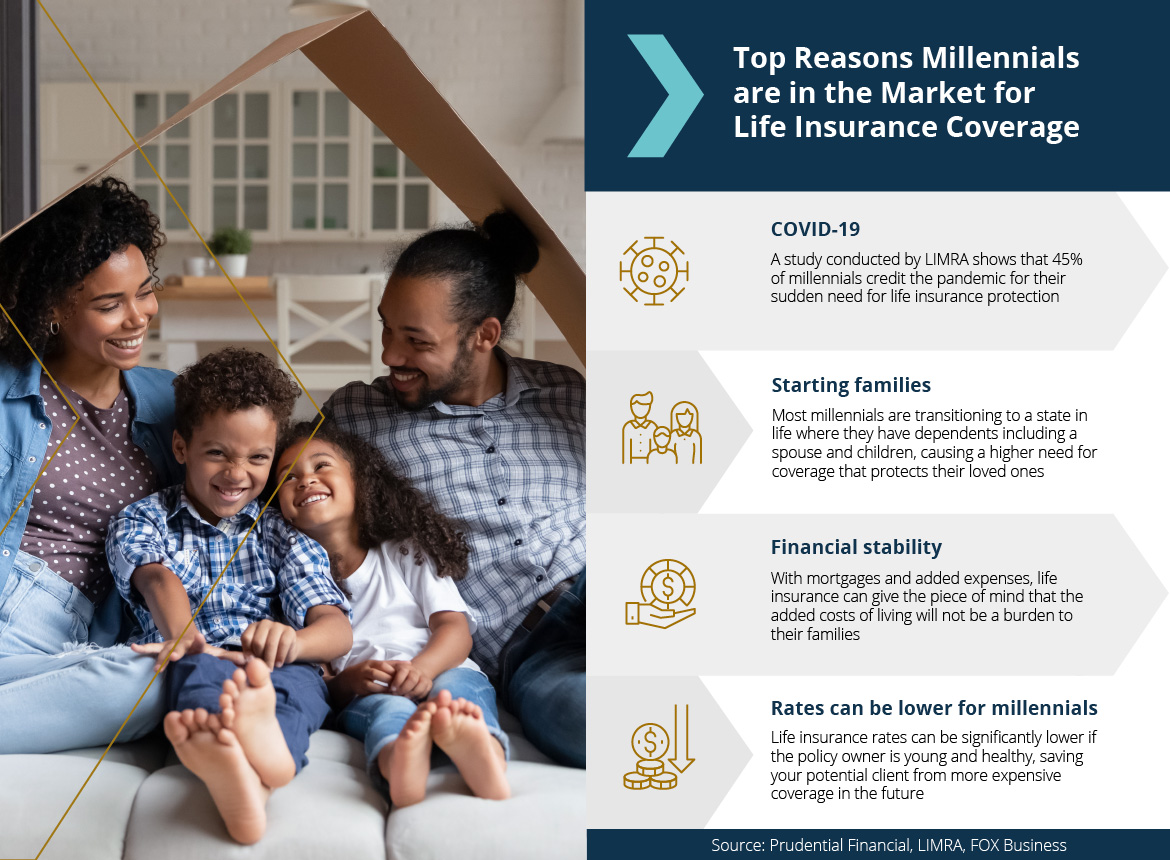Español
United States
Understanding Consumers / Life Insurance Trends
Millennials and Life Insurance: Stop Selling and Start Listening
April 06, 2023
Estimated Reading Time: 3m

123 RF
Often, the most effective life insurance sales calls involve little overt selling, but plenty of listening and some judicial advising. This certainly may be the most effective approach with Millennials, that vast generation of adults between the ages of 26 and 42.
Many Millennials still need —or at least, more of it. However, this well‑educated, independent cohort does not respond well to being “sold to” in any conventional sense.
A better alternative? Lead with a soft, conversational approach. Slow your sales process. Get to know your prospective clients by asking questions about their lives, fears and goals.
Their answers mean everything. Because they allow you to develop a personalized solution that’s more than life insurance, but a way to protect their priorities and achieve their dreams and goals.
A Recognized Need
- Lack of confidence regarding product knowledge
- Fear they won’t qualify
- The tendency to wildly overestimate cost and
- A reluctance to think about death
The good news is, thoughtful advisors can overcome these obstacles through gentle education. The key is to get their interest first—by finding out what makes them tick. That’s where your conversational skills come in.

“Tell Me about Your Family”
Of course, family is a primary reason for purchasing life insurance. According to Pew Research, 55% of Millennials have a spouse and/or child and another 28% live with their parents or other relatives. In other words, the majority of Millennials have loved ones who are at least partially financially dependent on them.
Therefore, it’s a given to ask Millennials about their families—and the logical follow up question: would they be provided for if something happened to you?
This may hit a nerve. According to LIMRA, more than half of Millennials admit that their families would suffer financial hardship within six months of their death. In fact, 30% say their family would struggle within the first month.
“Do You Have an Emergency Fund?”
Many Millennials experience financial anxiety. One study found that they worry about money more than any other generation, obsessing about finances seven times every day.
For this reason, educating Millennial clients about the benefits of cash value (which they may not fully understand) is key: that it passively accrues over time and that they could access it via a policy loan if needed.
Presenting permanent life insurance as a two‑for‑one—as both death benefit and savings vehicle—can be illuminating for Millennials. Not surprisingly, more than half of those purchased it consider cash value their emergency fund.
“Is Debt Something that Worries You?”
We know that many Millennials are also plagued by financial debt. For example, nearly three‑quarters of Millennials in the U.S. carry some form of it: student loans, credit card debt, auto loans—and that doesn’t include mortgages.
They worry how they can pay it off and if they’ll burden their loved ones—often their cosigners—should they die beforehand.
In fact, acquiring debt and failing to save is a top regret of Millennials. Once again, life insurance may be presented as an effective solution, especially when you also demonstrate how affordable it can be. For those on a tight budget, term life may be the way to go.
“When Do You Want to Retire?”
As a group, Millennials are focused on retirement. One industry survey found that Millennials want to retire at the age of 61—the youngest of any generation—although they worry that they won’t have enough funds to live comfortably.
That’s a realistic concern. While some Millennials have already started saving for retirement, because so many are living paycheck‑to‑paycheck, others are way behind. Once again, an ordinary or universal life policy with accumulating cash value can make a compelling solution.
As you know, any true dialogue involves give and take. When meeting with Millennials, listening is particularly important—as is offering information and solutions geared to their responses.
Therefore, perhaps it’s time to stop thinking about such meetings as “sales calls” and start viewing them as meaningful conversations.
When you can help others protect those they love and build a plan for achieving their goals, it goes beyond life insurance. You have the opportunity to make a difference in people’s lives.
To learn about solutions available for your clients,
The Phia Group Notice of Data Security Incident
NAHGA Claim Services Data Breach Information
